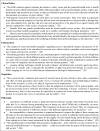Do CRISPR Germline Ethics Statements Cut It?
- PMID: 31021208
- PMCID: PMC6694771
- DOI: 10.1089/crispr.2017.0024
Do CRISPR Germline Ethics Statements Cut It?
Abstract
The extraordinary wave of genomic-engineering innovation, driven by CRISPR-Cas9, has sparked worldwide scientific and ethical uncertainty. Great concern has arisen across the globe about whether heritable genome editing should be permissible in humans-that is, whether it is morally acceptable to modify genomic material such that the "edit" is transferable to future generations. Here I examine 61 ethics statements released by the international community within the past 3 years about this controversial issue and consider the statements' overarching positions and limitations. Despite their inability to fully address all important considerations, many of the statements may advance debate and national and international law and public policy.
Conflict of interest statement
No competing financial interests exist.
Figures



References
-
- National Academies of Sciences Engineering and Medicine. Human genome editing: science, ethics, and governance. Washington, DC: The National Academies Press (U.S.) 2017 - PubMed
-
- National Academies of Sciences Engineering and Medicine. News. With stringent oversight, heritable germline editing clinical trials could one day be permitted for serious conditions; non-heritable clinical trials should be limited to treating or preventing disease or disability at this time. https://nam.edu/with-stringent-oversight-heritable-germline-editing-clin... (last accessed April14, 2018)
-
- Code of Federal Regulations: Research Involving Pregnant Women or Fetuses, 45 C.F.R. Sect 46 (2017)
-
- United States Code: Institutional Review Boards; Ethics Guidance Program, 42 U.S. Code Sect 289 (2017)
-
- Consolidated Appropriations Act of 2016. www.congress.gov/114/bills/hr2029/BILLS-114hr2029enr.pdf (last accessed April14, 2018)
LinkOut - more resources
Full Text Sources
Miscellaneous

